Download - Health Sciences - Curtin University
Download - Health Sciences - Curtin University
Download - Health Sciences - Curtin University
Create successful ePaper yourself
Turn your PDF publications into a flip-book with our unique Google optimized e-Paper software.
PSYCHOLOGY 706: GROUP PSYCHOTHERAPYUnit Index Numbers: 309533Tuition Pattern: Seminar/Workshop,4 hours/weekCredit Points: 25Unit Requisites: Psychology 704Unit Coordinator Dr Jan Grant(9266 7231) Room: 401:315LecturerDr Lynn Priddis(9266 3297) Room: 401:313SyllabusThis unit builds on student knowledge and skills developed in Individual Psychotherapy (Psychology704) and extends these to working with common theme groups. Key models for understandinggroup processes are examined and practical skills in group leadership are developed. Students areencouraged to participate in group experiences and are involved in the planning of a common themegroup in the community.Learning OutcomesUpon completion of this unit the students can:1. Apply understanding of the major models of therapeutic work with small groups.2. Design and lead or co-lead a common theme group.3. Utilise understanding of small group dynamics to make effective group interventions4. Plan, run and complete a group analysis for therapeutic groups.5. Design ongoing evaluations for small groups.6. Apply ethical guidelines to group design and leadership, in particular relevant sections of theAPS Code of Professional Conduct.7. Use current research related to group processes and outcomes, to design a group.Unit Outline1 Introduction to Group Psychotherapy Sociometry in Groups2Facilitation Skills 1: Yalom and Existential approaches.Interpersonal Processes3 CBT and Schema Therapy Groups with Mood DisordersTalking GroupsSchema Theory Group4 Group Dynamics 1: Focal Conflict Model. Action Methods Group5 Group Dynamics 2: Focal Conflict Model Action Methods Group67Group Dynamics 3: Projection and projective identification ingroups.Facilitation Skills 2: Role theory; Warm-up, Basic sociometry ingroupsStudent-Led GroupsStudent-Led Groups8 Facilitation Skills 3: Metaphor, concretization and maximization Student-Led Groups9 Group Dynamics 4: Symbolism and themes. Student-Led Groups33<strong>Curtin</strong> <strong>University</strong> is a trademark of <strong>Curtin</strong> <strong>University</strong> of Technology.CRICOS Provider Code 00301J (WA), 02637B (NSW)



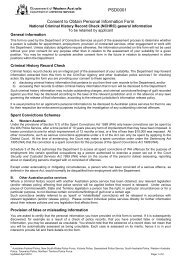

![Mental health commission report July 2010 - June 2011 [.pdf]](https://img.yumpu.com/50755705/1/184x260/mental-health-commission-report-july-2010-june-2011-pdf.jpg?quality=85)
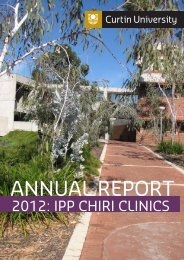


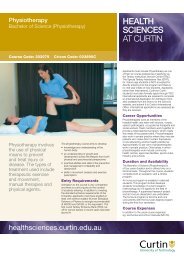
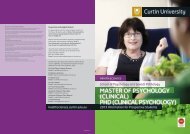


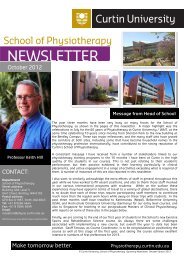


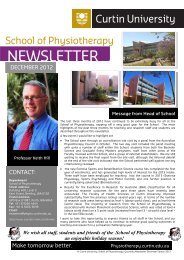
![2007 Annual Report [.pdf] - Health Sciences - Curtin University](https://img.yumpu.com/44476724/1/184x260/2007-annual-report-pdf-health-sciences-curtin-university.jpg?quality=85)